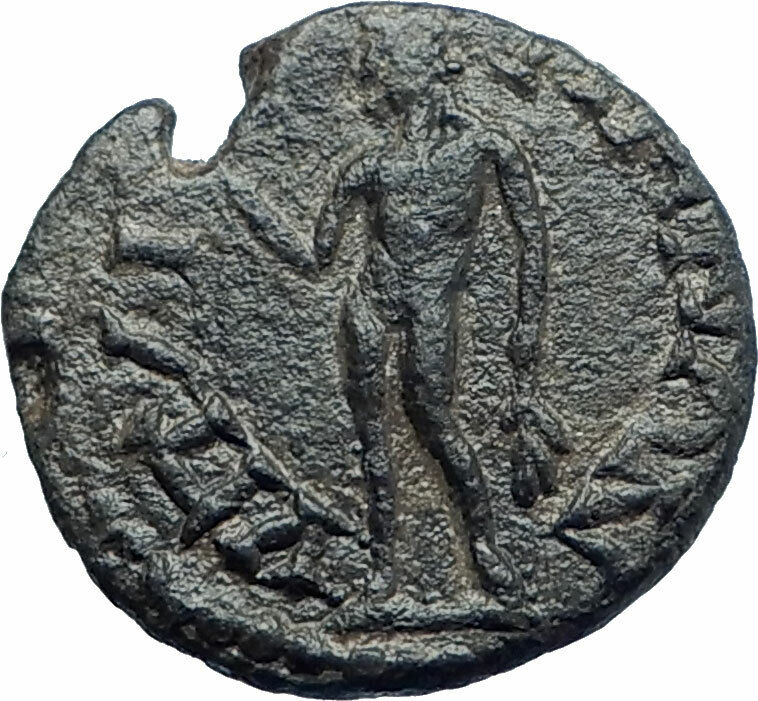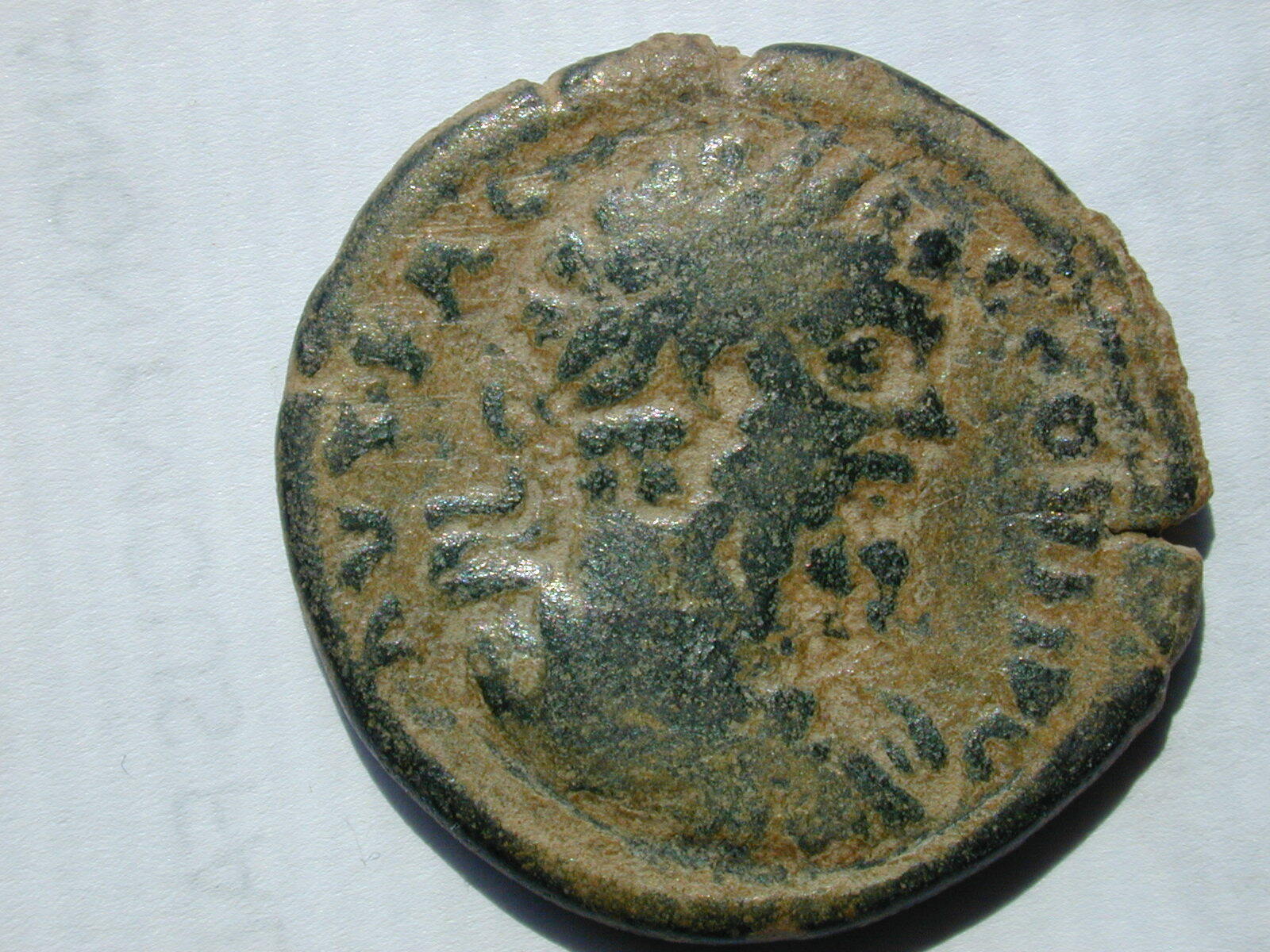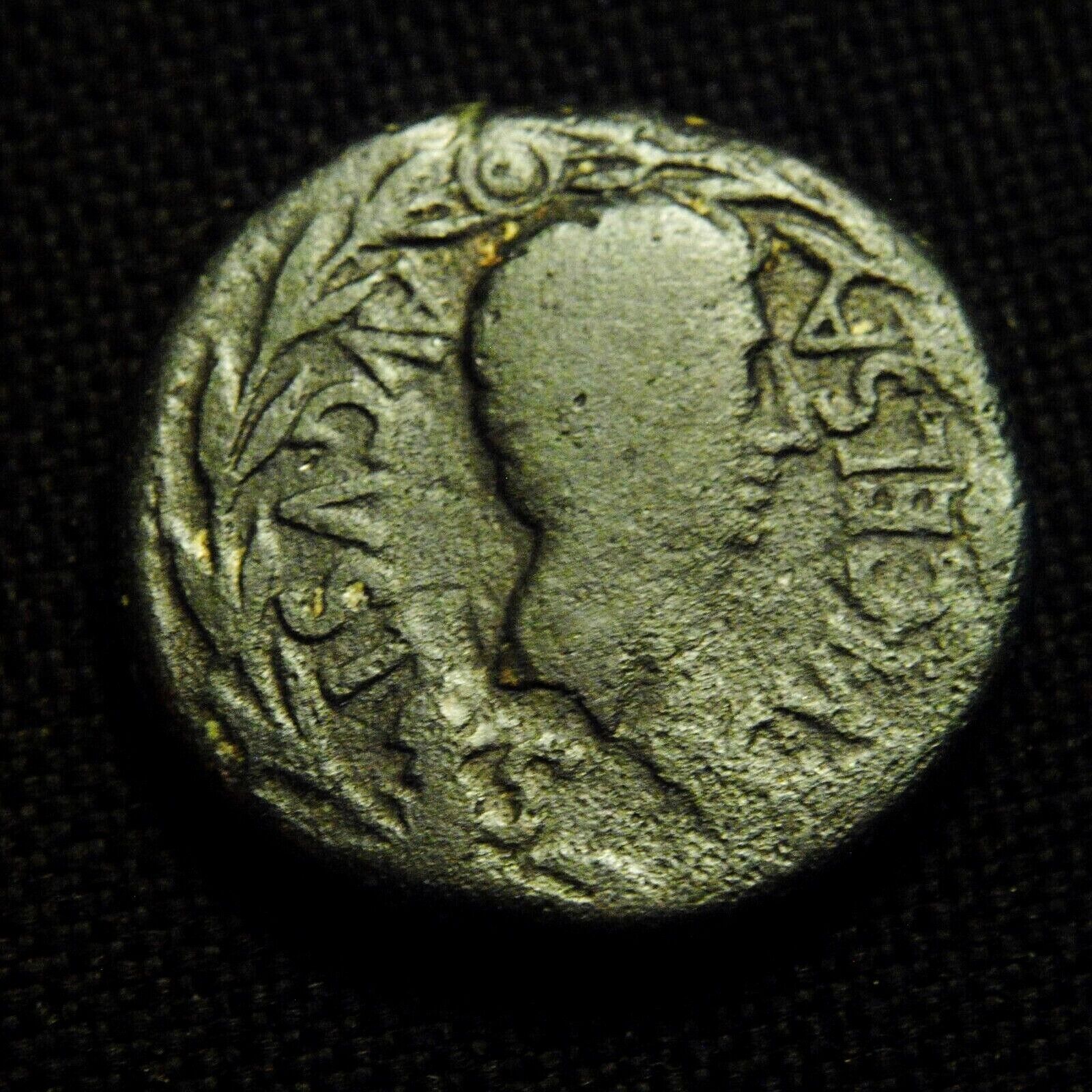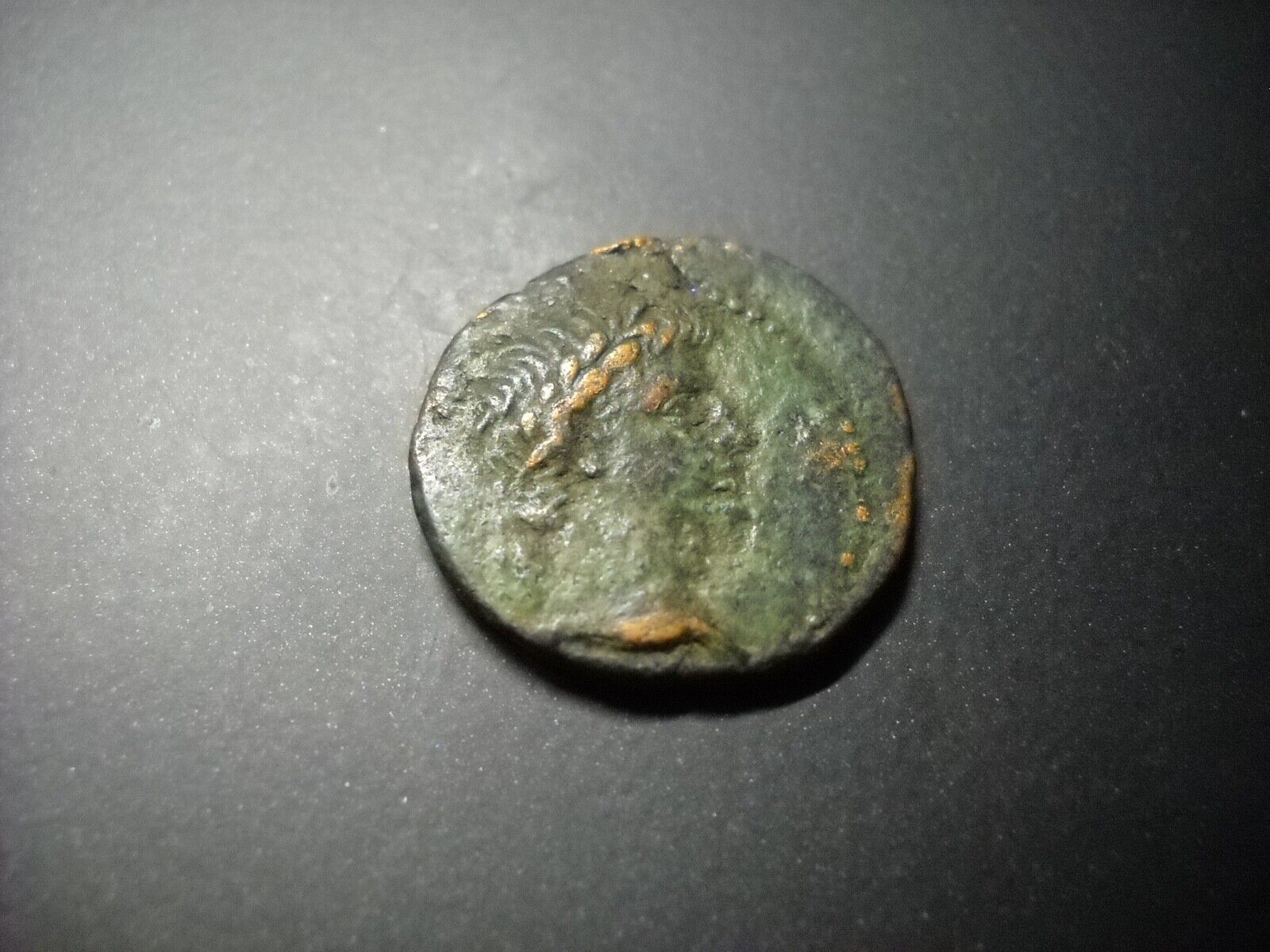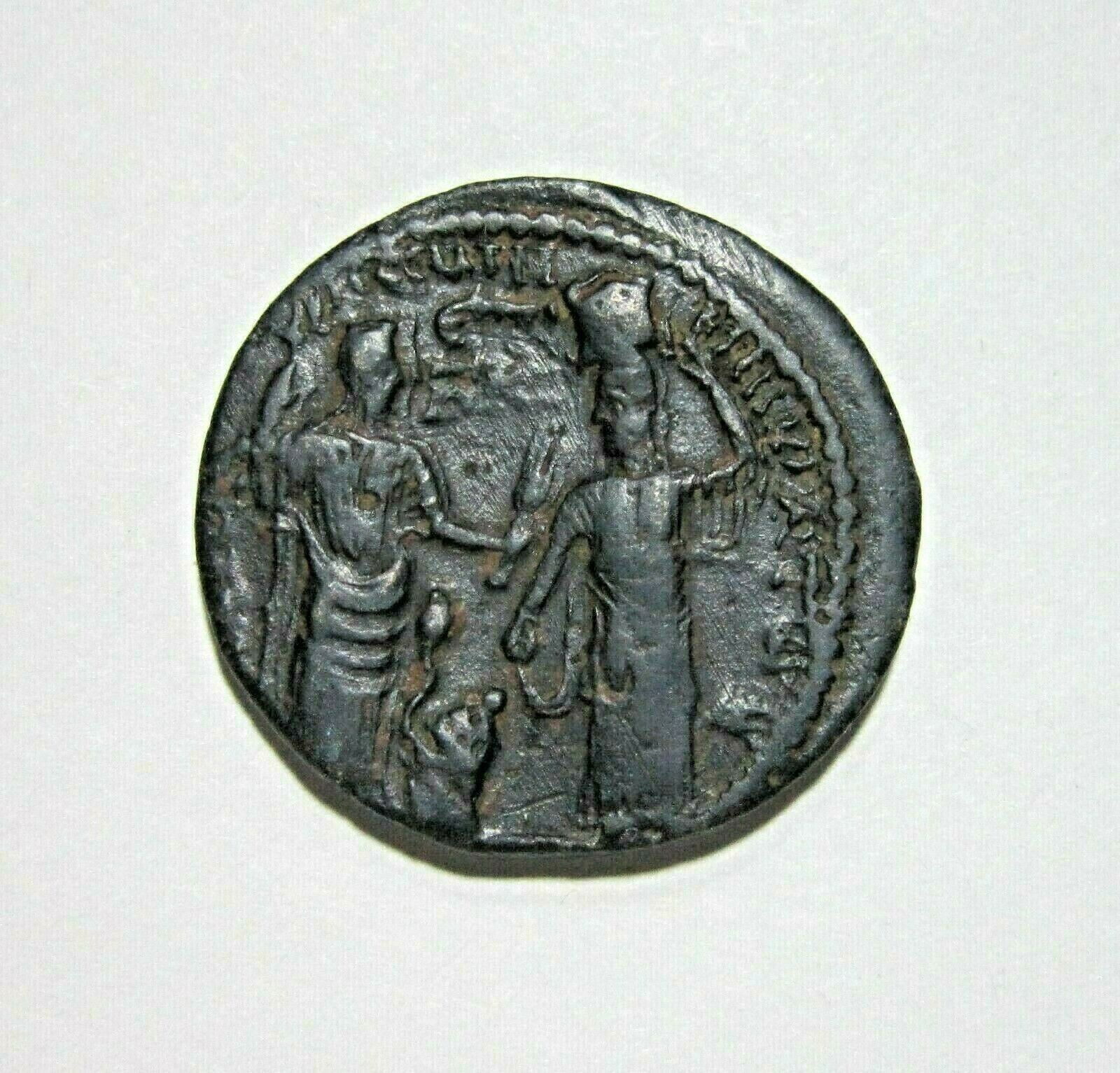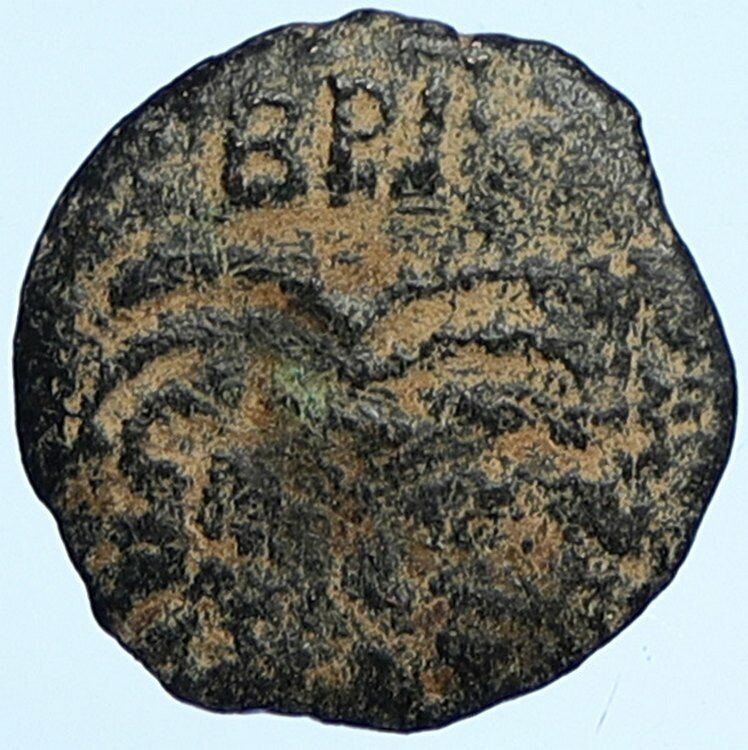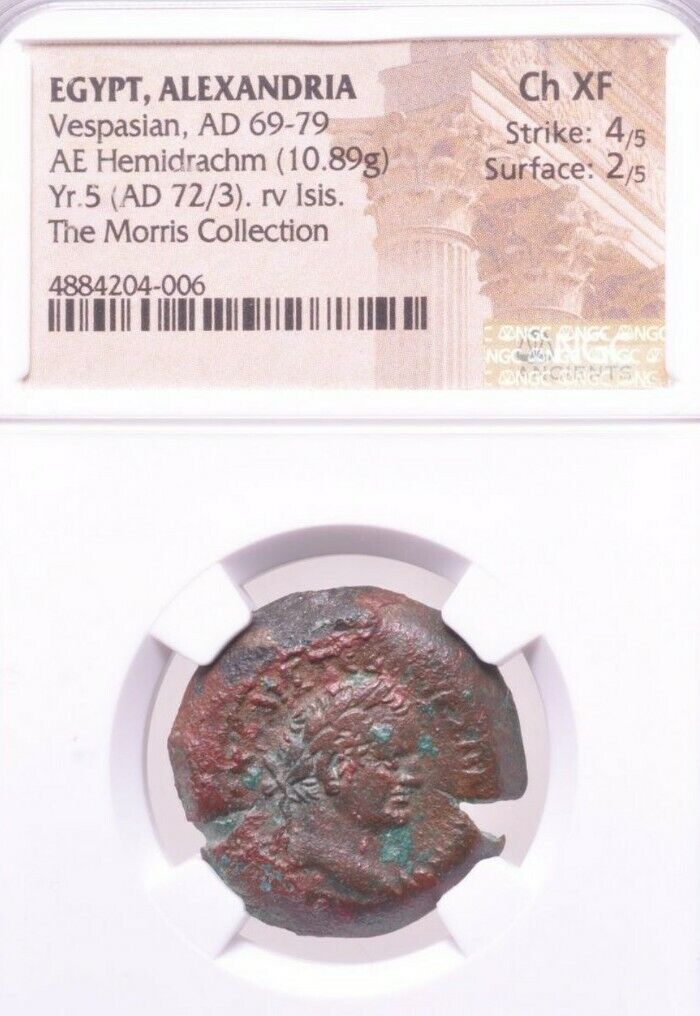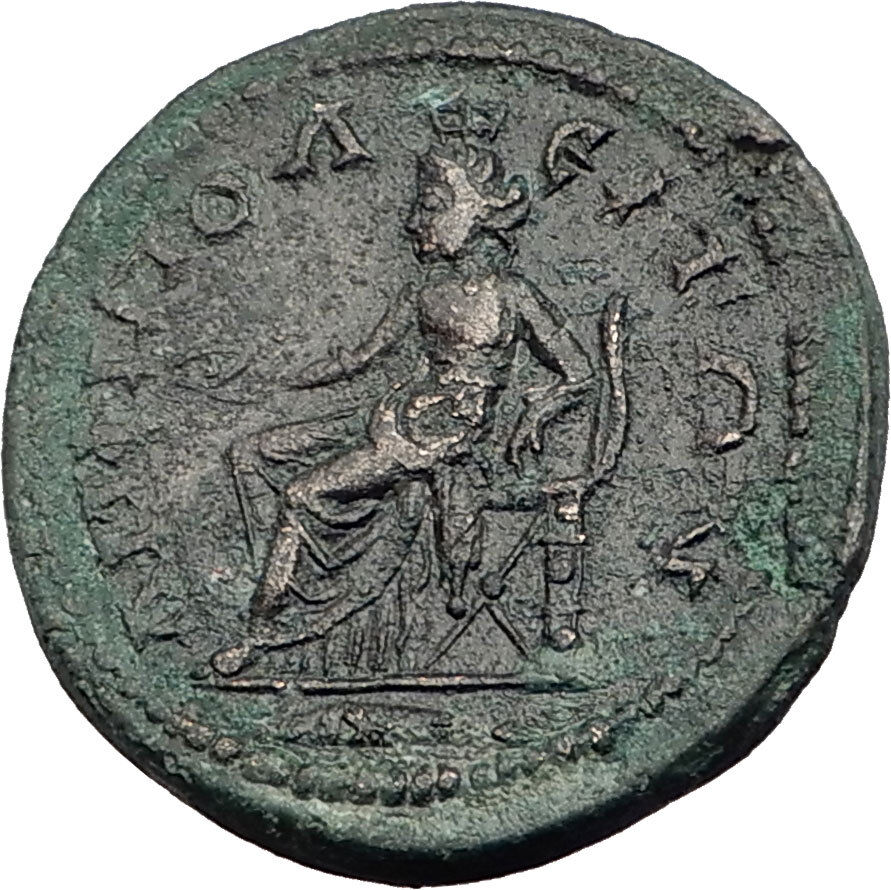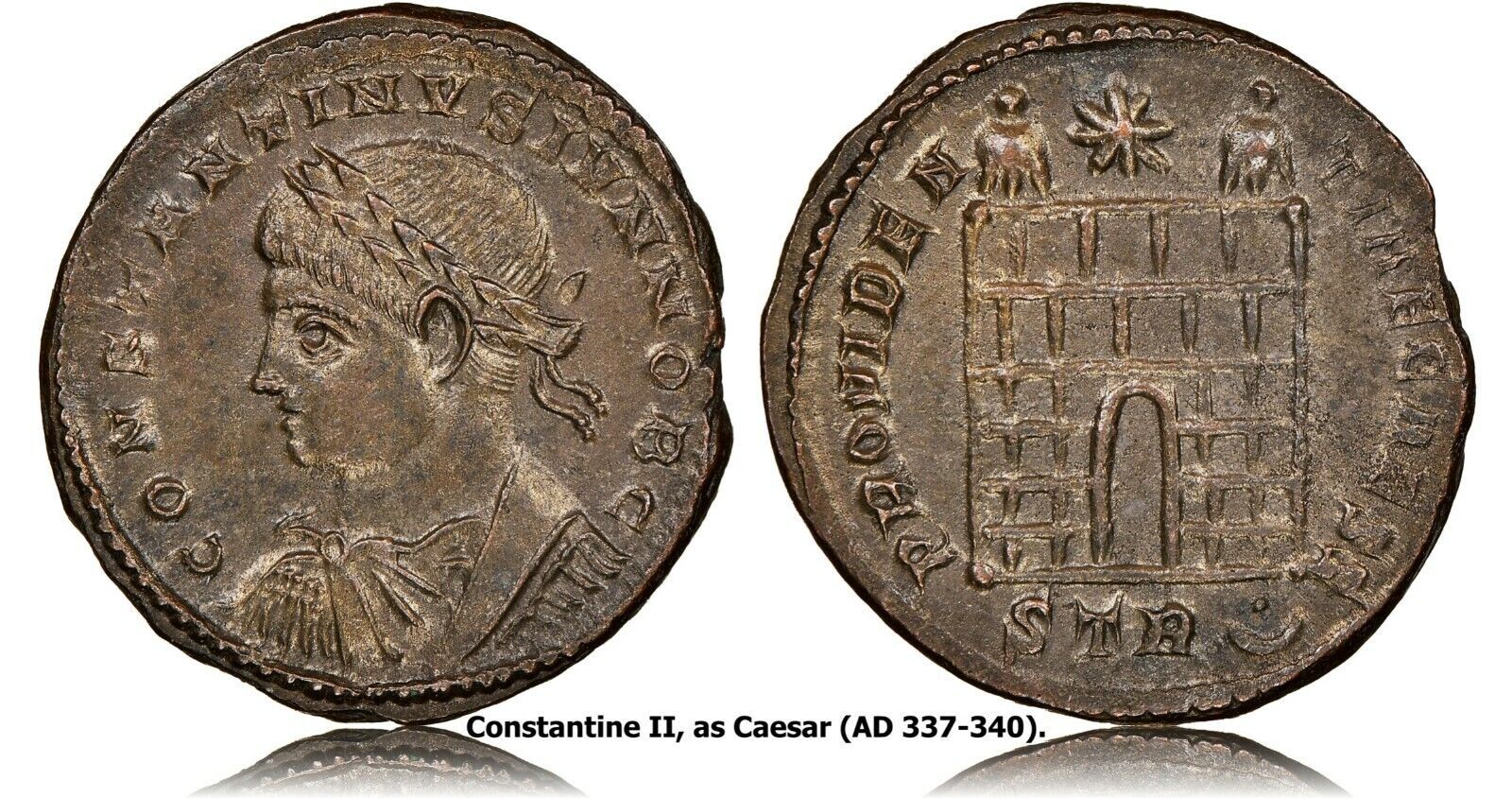-40%
SEPTIMIUS SEVERUS Rare Authentic Ancient HYPAEPA Lydia Roman Coin APOLLO i78419
$ 126.08
- Description
- Size Guide
Description
Item:i78419
Authentic Ancient Coin of:
Septimius Severus
-
Roman Emperor
: 193-211 A.D.
Bronze 16mm (2.75 grams) of of
Hypaepa
in
Lydia
.
Laureate head of Septimius Severus to right.
YΠAIΠHN/ΩN, Nude Apollo standing left holding branch and raising his right hand.
You are bidding on the exact item pictured, provided with a Certificate of Authenticity and Lifetime Guarantee of Authenticity.
In Greek and Roman mythology,
Apollo
, is one of the most important and diverse of the Olympian deities. The ideal of the
kouros
(a beardless youth), Apollo has been variously recognized as a god of light and the sun; truth and prophecy; archery; medicine and healing; music, poetry, and the arts; and more. Apollo is the son of Zeus and Leto, and has a twin sister, the chaste huntress Artemis. Apollo is known in Greek-influenced Etruscan mythology as
Apulu
. Apollo was worshiped in both ancient Greek and Roman religion, as well as in the modern Greco-Roman Neopaganism.
As the patron of Delphi (
Pythian Apollo
), Apollo was an oracular god - the prophetic deity of the Delphic Oracle. Medicine and healing were associated with Apollo, whether through the god himself or mediated through his son Asclepius, yet Apollo was also seen as a god who could bring ill-health and deadly plague as well as one who had the ability to cure. Amongst the god's custodial charges, Apollo became associated with dominion over colonists, and as the patron defender of herds and flocks. As the leader of the Muses (
Apollon Musagetes
) and director of their choir, Apollo functioned as the patron god of music and poetry. Hermes created the lyre for him, and the instrument became a common attribute of Apollo. Hymns sung to Apollo were called paeans.
In Hellenistic times, especially during the third century BCE, as
Apollo Helios
he became identified among Greeks with Helios, god of the sun, and his sister Artemis similarly equated with Selene, goddess of the moon. In Latin texts, on the other hand, Joseph Fontenrose declared himself unable to find any conflation of Apollo with Sol among the Augustan poets of the first century, not even in the conjurations of Aeneas and Latinus in
Aeneid
XII (161-215). Apollo and Helios/Sol remained separate beings in literary and mythological texts until the third century CE.
Hypaepa
was an Ancient city and (arch)bishopric in ancient Lydia, near the north bank of the Cayster River, and 42 miles from Ephesus, Ephesus and remains a Latin Catholic titular see. Its name was derived from its situation at the foot of Mount Aipos, itself a southern foothill of Mount Tmolus, Its location was identified by the Frenchmen Cousinéry and Texier and confirmed by the excavations carried out by Demostene Baltazzi on behalf of the Ottoman government in 1892. The ruins are close to the present-day village of Günlüce (earlier known as Datbey or Tapaı; in the Ottoman vilayet of Smyrna), 4 kilometres northwest of the town of Ödemiş.Its position looking towards the plain of Caystrus, was a strategic one on the route between Sardis and Ephesus.
History
Mount Tmolus
In 88 BC, Hypaepa rebelled against Mithridates VI of Pontus and was severely punished Under Roman Emperor Tiberius (AD 14-37) it was selection as a candidate for the location of a temple dedicated to worship of the Emperor, but was rejected as being too insignificant.
In fact, the Roman poet Ovid contrasted the great city of Sardis with what he called "little Hypaepa":
Sardibus hinc, illinc parvis finitur Hypaepis
.
Coinage of Hypaepa of the 3rd century AD are extant, until the time of Emperor Gallienus.
To judge by the number of Byzantine churches that it contained, Hypaepa flourished under the Byzantine Empire.
Mythology and pre-Christian religion
The women of Hypaepa were reputed to have received from the mythological Aphrodite the gift of beauty of form and dancing Ovid placed at Hypaepa the home of Arachne before she was turned into a spider.
The Persian goddess Anahita, identified with Artemis and therefore called Artemis Anaitis or Persian Artemis, was worshipped at Hypaepa, which had been part of the Achaemenid Empire. However, under the Roman Empire the priests of the temple bore Greek names, not Persian.
Pausanias mentions a rite performed in Hypaepa, in which wood was set alight apparently by magic.
An inscription from the synagogue of Sardis mentions a benefactor who was a member of the council of Hypaepa, indicating the presence there of a Jewish community.
Septimius Severus
-
Roman Emperor
: 193-211 A.D.
Augustus: 193-211 A.D. | 193-198 A.D. Sole reign; 195-198 A.D.
Caracalla
as Caesar | 198-209 A.D. with
Caracalla
;
Geta
as Caesar | 209-211 A.D. with
Caracalla
and
Geta
Husband of
Julia Domna
| Father of
Caracalla
and
Geta
| Uncle of
Julia Soaemias
and
Julia Mamaea
| Great-uncle of
Elagabalus
and
Severus Alexander
| Brother-in-law of
Julia Maesa
| Father-in-law of
Plautilla
|
Lucius Septimius Severus
(or rarely
Severus I
) (April 11, 145/146-February 4, 211) was a Roman general, and Roman Emperor from April 14, 193 to 211. He was born in what is now the Berber part of Rome's historic Africa Province.
Septimius Severus was born and raised at Leptis Magna (modern Berber, southeast of Carthage, modern Tunisia). Severus came from a wealthy, distinguished family of equestrian rank. Severus was of Italian Roman ancestry on his mother's side and of Punic or Libyan-Punic ancestry on his father's. Little is known of his father, Publius Septimius Geta, who held no major political status but had two cousins who served as consuls under emperor Antoninus Pius. His mother, Fulvia Pia's family moved from Italy to North Africa and was of the Fulvius gens, an ancient and politically influential clan, which was originally of plebeian status. His siblings were a younger Publius Septimius Geta and Septimia Octavilla. Severus's maternal cousin was Praetorian Guard and consul Gaius Fulvius Plautianus.
In 172, Severus was made a Senator by the then emperor Marcus Aurelius. In 187 he married secondly Julia Domna. In 190 Severus became consul, and in the following year received from the emperor Commodus (successor to Marcus Aurelius) the command of the legions in Pannonia.
On the murder of Pertinax by the troops in 193, they proclaimed Severus Emperor at Carnuntum, whereupon he hurried to Italy. The former emperor, Didius Julianus, was condemned to death by the Senate and killed, and Severus took possession of Rome without opposition.
The legions of Syria, however, had proclaimed Pescennius Niger emperor. At the same time, Severus felt it was reasonable to offer Clodius Albinus, the powerful governor of Britannia who had probably supported Didius against him, the rank of Caesar, which implied some claim to succession. With his rearguard safe, he moved to the East and crushed Niger's forces at the Battle of Issus. The following year was devoted to suppressing Mesopotamia and other Parthian vassals who had backed Niger. When afterwards Severus declared openly his son Caracalla as successor, Albinus was hailed emperor by his troops and moved to Gallia. Severus, after a short stay in Rome, moved northwards to meet him. On February 19, 197, in the Battle of Lugdunum, with an army of 100,000 men, mostly composed of Illyrian, Moesian and Dacian legions, Severus defeated and killed Clodius Albinus, securing his full control over the Empire.
Emperor
Severus was at heart a soldier, and sought glory through military exploits. In 197 he waged a brief and successful war against the Parthian Empire in retaliation for the support given to Pescennius Niger. The Parthian capital Ctesiphon was sacked by the legions, and the northern half of Mesopotamia was restored to Rome.
His relations with the Roman Senate were never good. He was unpopular with them from the outset, having seized power with the help of the military, and he returned the sentiment. Severus ordered the execution of dozens of Senators on charges of corruption and conspiracy against him, replacing them with his own favorites.
He also disbanded the Praetorian Guard and replaced it with one of his own, made up of 50,000 loyal soldiers mainly camped at Albanum, near Rome (also probably to grant the emperor a kind of centralized reserve). During his reign the number of legions was also increased from 25/30 to 33. He also increased the number of auxiliary corps (
numerii
), many of these troops coming from the Eastern borders. Additionally the annual wage for a soldier was raised from 300 to 500
denarii
.
Although his actions turned Rome into a military dictatorship, he was popular with the citizens of Rome, having stamped out the rampant corruption of Commodus's reign. When he returned from his victory over the Parthians, he erected the Arch of Septimius Severus in Rome.
According to Cassius Dio, however, after 197 Severus fell heavily under the influence of his Praetorian Prefect, Gaius Fulvius Plautianus, who came to have almost total control of most branches of the imperial administration. Plautianus's daughter, Fulvia Plautilla, was married to Severus's son, Caracalla. Plautianus's excessive power came to an end in 205, when he was denounced by the Emperor's dying brother and killed. The two following
praefecti
, including the jurist Aemilius Papinianus, received however even larger powers.
Campaigns in Caledonia (Scotland)
Starting from 208 Severus undertook a number of military actions in Roman Britain, reconstructing Hadrian's Wall and campaigning in Scotland.
He reached the area of the Moray Firth in his last campaign in Caledonia, as was called Scotland by the Romans.. In 210 obtained a peace with the Picts that lasted practically until the final withdrawal of the Roman legions from Britain, before falling severely ill in Eboracum (York).
Death
He is famously said to have given the advice to his sons: "Be harmonious, enrich the soldiers, and scorn all other men" before he died at Eboracum on February 4, 211. Upon his death in 211, Severus was deified by the Senate and succeeded by his sons, Caracalla and Geta, who were advised by his wife Julia Domna. The stability Severus provided the Empire was soon gone under their reign.
Accomplishments and Record
Though his military expenditure was costly to the empire, Severus was the strong, able ruler that Rome needed at the time. He began a tradition of effective emperors elevated solely by the military. His policy of an expanded and better-rewarded army was criticized by his contemporary Dio Cassius and Herodianus: in particular, they pointed out the increasing burden (in the form of taxes and services) the civilian population had to bear to maintain the new army.
Severus was also distinguished for his buildings. Apart from the triumphal arch in the Roman Forum carrying his full name, he also built the Septizodium in Rome and enriched greatly his native city of Leptis Magna (including another triumphal arch on the occasion of his visit of 203).
Severus and Christianity
Christians were persecuted during the reign of Septimus Severus. Severus allowed the enforcement of policies already long-established, which meant that Roman authorities did not intentionally seek out Christians, but when people were accused of being Christians they could either curse Jesus and make an offering to Roman gods, or be executed. Furthermore, wishing to strengthen the peace by encouraging religious harmony through syncretism, Severus tried to limit the spread of the two quarrelsome groups who refused to yield to syncretism by outlawing conversion to Christianity or Judaism. Individual officials availed themselves of the laws to proceed with rigor against the Christians. Naturally the emperor, with his strict conception of law, did not hinder such partial persecution, which took place in Egypt and the Thebaid, as well as in Africa proconsularis and the East. Christian martyrs were numerous in Alexandria (cf. Clement of Alexandria,
Stromata
, ii. 20; Eusebius,
Church History
, V., xxvi., VI., i.). No less severe were the persecutions in Africa, which seem to have begun in 197 or 198 (cf. Tertullian's
Ad martyres
), and included the Christians known in the
Roman martyrology
as the martyrs of Madaura. Probably in 202 or 203 Felicitas and Perpetua suffered for their faith. Persecution again raged for a short time under the proconsul Scapula in 211, especially in Numidia and Mauritania. Later accounts of a Gallic persecution, especially at Lyon, are legendary. In general it may thus be said that the position of the Christians under Septimius Severus was the same as under the Antonines; but the law of this Emperor at least shows clearly that the rescript of Trajan had failed to execute its purpose.
Frequently Asked Questions
Mr. Ilya Zlobin
, world-renowned expert numismatist, enthusiast, author and dealer in authentic ancient Greek, ancient Roman, ancient Byzantine, world coins & more.
Who am I dealing with?
You are dealing with Ilya Zlobin, ancient coin expert, enthusiast, author and dealer with an online store having a selection of over 15,000 items with great positive feedback from verified buyers and over 10 years experience dealing with over 57,000 ancient and world coins and artifacts. Ilya Zlobin is an independent individual who has a passion for coin collecting, research and understanding the importance of the historical context and significance all coins and objects represent. Most others are only concerned with selling you, Ilya Zlobin is most interested in educating you on the subject, and providing the largest selection, most professional presentation and service for the best long-term value for collectors worldwide creating returning patrons sharing in the passion of ancient and world coin collecting for a lifetime.
How long until my order is shipped?
Orders are shipped by the next business day (after receipt of payment) most of the time.
How will I know when the order was shipped?
After your order has shipped, you will be left positive feedback, and that date could be used as a basis of estimating an arrival date. Any tracking number would be found under your 'Purchase history' tab.
USPS First Class mail takes about 3-5 business days to arrive in the U.S. International shipping times cannot be estimated as they vary from country to country.
Standard international mail to many countries
does not
include a tracking number, and can also be slow sometimes.
For a tracking number and signature confirmation, you may want to do Express Mail International Shipping, which costs more, however, is the fastest and most secure. Additionally you may be able to receive your order in as little as 3-5 business days using this method. For Express Mail International, it may be possible to place up to 10-15 items in one package (for the one shipping cost) as it is flat rate envelope, which may be the most cost-effective, secure and fastest way to receive items internationally. Send me a message about this and I can update your invoice should you want this method.
Getting your order to you, quickly and securely is a top priority and is taken seriously here.
Great care is taken in packaging and mailing every item securely and quickly.
Please be aware, I cannot take responsibility for any postal service delivery delays, especially for international packages as it may happen in rare instances.
What is a certificate of authenticity and what guarantees do you give that the item is authentic?
Each of the items sold here, is provided with a Certificate of Authenticity, and a Lifetime Guarantee of Authenticity, issued by a world-renowned numismatic and antique expert that has identified over 57,000 ancient coins and has provided them with the same guarantee. You will be very happy with what you get with the COA; a professional presentation of the coin, with all of the relevant information and a picture of the coin you saw in the listing. Additionally, the coin is inside it's own protective coin flip (holder), with a 2x2 inch description of the coin matching the individual number on the COA.
On the free-market such a presentation alone, can be considered a - value all in itself, and it comes standard with your purchases from me,
FREE.
With every purchase, you are leveraging my many years of experience to get a more complete context and understanding of the piece of history you are getting. Whether your goal is to collect or give the item as a gift, coins presented like this could be more prized and valued higher than items that were not given such care and attention to.
Buy a coin today and own a piece of history, guaranteed.
Is there a money back guarantee?
I offer a 30 day unconditional money back guarantee. I stand behind my coins and would be willing to exchange your order for either store credit towards other coins, or refund, minus shipping expenses, within 30 days from the receipt of your order. My goal is to have the returning customers for a lifetime, and I am so sure in my coins, their authenticity, numismatic value and beauty, I can offer such a guarantee.
Is there a number I can call you with questions about my order?
You can contact me directly via ask seller a question and request my telephone number, or go to my
About Me Page
to get my contact information only in regards to items purchased on eBay.
When should I leave feedback?
Once you receive your order, please leave a positive feedback. Please don't leave any negative feedbacks, as it happens sometimes that people rush to leave feedback before letting sufficient time for their order to arrive. Also, if you sent an email, make sure to check for my reply in your messages before claiming that you didn't receive a response. The matter of fact is that any issues can be resolved, as reputation is most important to me. My goal is to provide superior products and quality of service.
How and where do I learn more about collecting ancient coins?
Visit the
"Guide on How to Use My Store"
for on an overview about using my store, with additional information and links to all other parts of my store which may include educational information on topics you are looking for.
